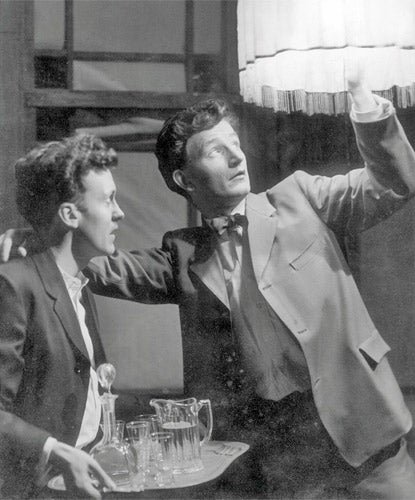TP McKenna: Actor whose career took him from the Abbey Theatre to numerous character roles on stage and screen

One of Ireland's most prolific actors, TP McKenna found success after moving across the water to Britain, taking character parts on screen and stage for almost half a century. The thick, dark hair eventually turned silver, which combined with McKenna's penetrating eyes to give him a distinctive look in a wide range of roles, from villains and priests to doctors, lawyers and detectives, although he once remarked: "I'm usually cast as a shit."
Thomas Patrick McKenna was born in Mullagh, Co Cavan, in 1929, the son of an auctioneer. He attended Mullagh School and St Patrick's College, Cavan, where he excelled as a soprano in Gilbert and Sullivan operas and gained an interest in drama.
However, on leaving in 1948, his first job was with the Ulster Bank, in Granard, Co Longford. During his six years with the bank, moves to other branches led him to Ireland's capital, where he spent most of his spare time performing with the Dublin Shakespeare Society and the Rathmines and Rathgar Musical Society.
In 1954, threatened with a further move to a branch in a sleepy, country town, McKenna resigned and pursued professional acting roles. He made his début as John Buchanan in the Tennessee Williams play Summer and Smoke at the Pike Theatre, Dublin, in 1954, and followed it with a Shakespeare summer season staged by the Anew McMaster company at the city's Gaiety Theatre that year.
McKenna joined the company at the Abbey Theatre, Dublin, in 1955 – having made a couple of appearances there already – and took more than 100 roles over the next eight years, as well as gaining experience on Radio Eireann as a disc jockey, before moving to London. By then, he had appeared in nine films shot in Ireland, starting with Broth of a Boy (1959) and including A Terrible Beauty (1960, playing one of Robert Mitchum's henchmen), The Siege of Sidney Street (1960, as an anarchist) and a 1962 adaptation of Brendan Behan's play The Quare Fellow.
His opportunity in Britain came with the opening of the Dublin Theatre Festival's production of Stephen D, in which he played Cranly, at St Martin's Theatre in 1963. "The play was such an enormous success in London, it was startling," McKenna recalled. "The offers literally came pouring in." The director John McGrath immediately gave him a co-starring role in Tom Murphy's BBC play The Fly Sham (1963), and The Strain (1963), by Alun Owen, quickly followed.
At the time, McKenna said he enjoyed playing the anti-hero, although he had a wide range of roles in popular 1960s television dramas such as Dr Finlay's Casebook (two characters, 1964, 1969), The Avengers (three parts, 1964-68), Dixon of Dock Green (1965) and The Saint (two roles, 1966, 1968).
Donning spectacles, he acted a maverick Russian agent in a three-part story in the Callan series (1972 ). The first episode was notable for being almost entirely a two-hander, with McKenna and Edward Woodward (as Callan) holed up alone together in a safe house, snarling and spitting at each other.
The actor also exuded menace when he played two Nazis, an SS commander responsible for executing thousands of Jews, in the mini-series Holocaust (1978) and Himmler in the television film The Scarlet and the Black (1983).
One part he acted, on and off, over a long period of time (1975-82) was the barrister Patrick Canty in the ITV lunchtime series Crown Court, with actors learning two endings and performing the one that was relevant to the real-life jury's verdict.
When McKenna played the Royal Ulster Constabulary Chief Constable Sir John Hermon in the drama-documentary Shoot to Kill (1990), about the Stalker Inquiry into the killings of six unarmed men by the police in Northern Ireland, his real-life alter ego received an out-of-court libel settlement after complaining of bias and inaccuracy, despite the director Peter Kosminsky's attempts to balance all the arguments.
On the big screen, McKenna took the role of the medical student Buck Milligan in Joseph Strick's 1967 version of James Joyce's novel Ulysses, a film that was banned in the actor's native country for being "subversive to public morality".
He was also seen as the war correspondent William Howard Russsell in The Charge of the Light Brigade (1968), directed by Tony Richardson, and as the doomed, one-armed, local magistrate in the director Sam Peckinpah's disturbing Straw Dogs (1971). Later, he acted alongside Johnny Depp in The Libertine (2004).
There were stage appearances at the Royal Court and with the National Theatre and Royal Shakespeare Companies, and McKenna made occasional trips back to Ireland for screen and stage work. He played Andrew Wyke in the Anthony Shaffer play Sleuth at both the Opera House, Cork, and the Olympia Theatre, Dublin (1973). He also acted the Irish prime minister in the television drama The Ambassador (1998) and appeared in the television soap opera Fair City (2003-04) as Fr Tom Mitchell, a former priest supporting a victim in a clerical sexual abuse scandal.
McKenna is survived by his daughter and four sons, two of whom, Kilian and Breffni, followed him into acting. His wife, May, died five years ago.
Anthony Hayward
Thomas Patrick McKenna, actor: born Mullagh, Co Cavan 7 September 1929; married 1955 May White (died 2006; four sons, one daughter); died London 13 February 2011.
Join our commenting forum
Join thought-provoking conversations, follow other Independent readers and see their replies
Comments
Bookmark popover
Removed from bookmarks